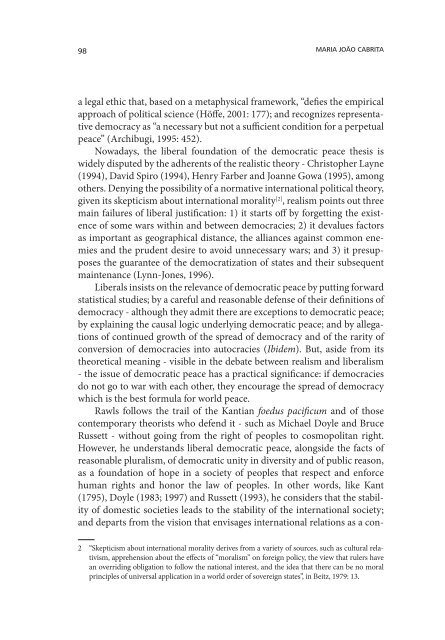Diacritica 25-2_Filosofia.indb - cehum - Universidade do Minho
Diacritica 25-2_Filosofia.indb - cehum - Universidade do Minho
Diacritica 25-2_Filosofia.indb - cehum - Universidade do Minho
Create successful ePaper yourself
Turn your PDF publications into a flip-book with our unique Google optimized e-Paper software.
98<br />
MARIA JOÃO CABRITA<br />
a legal ethic that, based on a metaphysical framework, “defi es the empirical<br />
approach of political science (Höff e, 2001: 177); and recognizes representative<br />
democracy as “a necessary but not a suffi cient condition for a perpetual<br />
peace” (Archibugi, 1995: 452).<br />
Nowadays, the liberal foundation of the democratic peace thesis is<br />
widely disputed by the adherents of the realistic theory - Christopher Layne<br />
(1994), David Spiro (1994), Henry Farber and Joanne Gowa (1995), among<br />
others. Denying the possibility of a normative international political theory,<br />
given its skepticism about international morality [2] , realism points out three<br />
main failures of liberal justifi cation: 1) it starts off by forgetting the existence<br />
of some wars within and between democracies; 2) it devalues factors<br />
as important as geographical distance, the alliances against common enemies<br />
and the prudent desire to avoid unnecessary wars; and 3) it presupposes<br />
the guarantee of the democratization of states and their subsequent<br />
maintenance (Lynn-Jones, 1996).<br />
Liberals insists on the relevance of democratic peace by putting forward<br />
statistical studies; by a careful and reasonable defense of their defi nitions of<br />
democracy - although they admit there are exceptions to democratic peace;<br />
by explaining the causal logic underlying democratic peace; and by allegations<br />
of continued growth of the spread of democracy and of the rarity of<br />
conversion of democracies into autocracies (Ibidem). But, aside from its<br />
theoretical meaning - visible in the debate between realism and liberalism<br />
- the issue of democratic peace has a practical signifi cance: if democracies<br />
<strong>do</strong> not go to war with each other, they encourage the spread of democracy<br />
which is the best formula for world peace.<br />
Rawls follows the trail of the Kantian foedus pacifi cum and of those<br />
contemporary theorists who defend it - such as Michael Doyle and Bruce<br />
Russett - without going from the right of peoples to cosmopolitan right.<br />
However, he understands liberal democratic peace, alongside the facts of<br />
reasonable pluralism, of democratic unity in diversity and of public reason,<br />
as a foundation of hope in a society of peoples that respect and enforce<br />
human rights and honor the law of peoples. In other words, like Kant<br />
(1795), Doyle (1983; 1997) and Russett (1993), he considers that the stability<br />
of <strong>do</strong>mestic societies leads to the stability of the international society;<br />
and departs from the vision that envisages international relations as a con-<br />
2 “Skepticism about international morality derives from a variety of sources, such as cultural relativism,<br />
apprehension about the eff ects of “moralism” on foreign policy, the view that rulers have<br />
an overriding obligation to follow the national interest, and the idea that there can be no moral<br />
principles of universal application in a world order of sovereign states”, in Beitz, 1979: 13.<br />
<strong>Diacritica</strong> <strong>25</strong>-2_<strong>Filosofia</strong>.<strong>indb</strong> 98 05-01-2012 09:38:23











![Programa [pdf] - cehum - Universidade do Minho](https://img.yumpu.com/17305425/1/190x135/programa-pdf-cehum-universidade-do-minho.jpg?quality=85)




